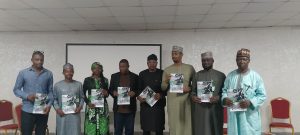
From Femi Mustapha, in Kaduna
The Technical Working Group on Social Protection of the Open Government Partnership (OGP) has released the Kaduna State Community Engagement Framework for Climate-Related Shock-Responsive Social Protection for the citizens.
The event was supported by the Foreign and Commonwealth Office, Partnership for Agile Governance and Climate Engagement (PACE), and LAFIYA-FCDO.
Speaking at the event, the Citizens Co-chair SAP III Social Protection, Sumayya Abdullahi Hussaini, explained that the journey to developing a framework has been a deeply collaborative process, adding that it is driven by passion, commitment, and a shared vision to ensure no one is left behind.
She added that the framework also incorporates digital tools, town halls, ward and school-based committees, and participatory data collection to ensure communities co-own solutions.
“Together, we have co-created more than a document. We have made a promise to act, to listen, and to stand with every citizen in building a resilient and responsive Kaduna. This is only the beginning”.
Martins Dangwa, the lead consultant of the project, emphasized that the framework is the result of a co-creation process between government actors and civil society groups.
“We are here to disseminate and launch a document that provides clarity on community engagement in addressing climate-related shocks. Until now, Kaduna lacked a comprehensive instrument that defined community participation levels in environmental and social resilience efforts”.
According to Dangwa, the new framework is a strategic tool aimed at bridging longstanding gaps in participatory governance.
“While the state has previously employed instruments such as community-based targeting and development charters, these lacked the structure to fully reflect community experiences and expectations”.
Martins stressed that communities are not only vulnerable to climate change but also critical in crafting solutions.
“Whatever you are doing for them without them is an effort in futility,” he remarked, urging broad adoption of the framework across not just local communities but unions, associations, and the private sector. With joint responsibility now placed on both civil society and government, the document is expected to shift Kaduna’s approach to climate resilience from theory to actionable, result-based interventions.
The Special Adviser to the governor, Uba Sani, on climate change, Hon. Yusuf Amoke, commended the Technical Working Group for developing the Framework, assuring that the Kaduna State government is committed to the implementation of the documents.
The stakeholders echoed the importance of tree planting as a solution to climate problems.
They also advised Nigerians to stop the indiscriminate dumping of refuse to reduce drainage blockages.
ENDS






